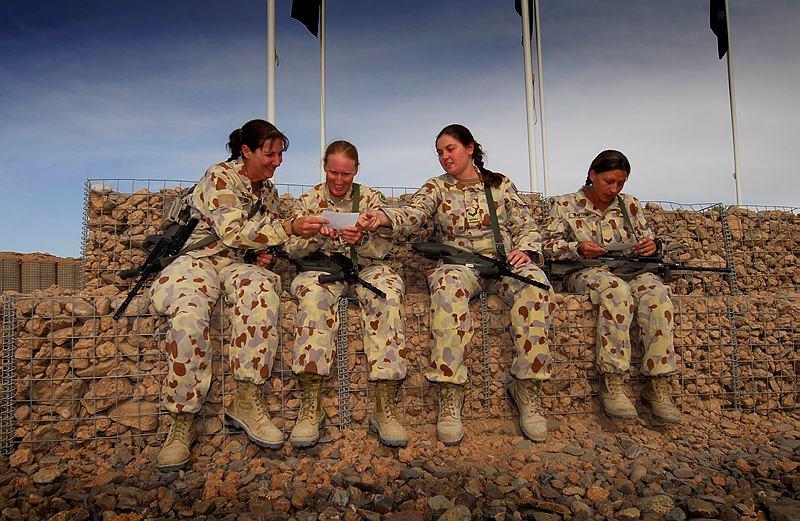The ‘sons—and daughters—of ANZAC’?
Posted By Bethan Greener and Anna Powles on May 5, 2015 @ 14:30
When Prime Minister Tony Abbott opened the Australian memorial at New Zealand’s Pukeahu National War Memorial Park, he declared that New Zealand defence force personnel deploying to Iraq would be ‘splendid sons of ANZAC’ [2]. In doing so, he marginalised the good efforts made on both sides of the Tasman to advance the role of women in the military.
Consider the message of gender equality championed by his Chief of Army, Lieutenant General David Morrison, for instance. Morrison has labelled gender inequality [3] in militaries a ‘global disgrace’ and stated at the 2014 Global Summit to End Sexual Violence that armies that ‘value the male over the female…do nothing to distinguish the soldier from the brute.’ Strong language, certainly, but this is a strong message—and language matters.
Abbott’s actions are reflective of habits that, intended or otherwise, deny recognition to Australia’s and New Zealand’s serving female personnel, and they symbolise the ongoing challenges in gender equality.
Gender inequality and marginalisation remain significant problems in world affairs. Today, the New Zealand chapter of the Women in International Security (WIIS) organisation is hosting a public discussion [4] about the draft National Action Plan on Women, Peace and Security. United Nations Security Council Resolution 1325 (2000) was the first resolution to focus exclusively on women in armed conflict and called on all UN member states to develop a National Action Plan on Women, Peace and Security. But the event also relates to the more general recognition about gender issues remaining outstanding in addressing conflict resolution, wartime atrocities [5] and post conflict recovery.
The liberal feminist desire to see women in combat is to some degree being addressed, but many other feminist viewpoints such as those that stress concerns about militarisation remain ignored. To have such outdated slogans repeated publicly, in a word, is offensive, and it’s incorrect.
Female NZDF personnel are deploying [6] as part of the Building Partner Capacity training mission. The Chief of Defence Force, Lieutenant General Tim Keating has stated that, notwithstanding cultural sensitivities, ‘there’s going to be a mixed element to all the roles that people are undertaking up there.’ While the BPC training mission is not a combat mission, it is often forgotten that New Zealand was one of the first countries to allow women in combat roles. The Air Force opened combat roles up to women in 1988 and women have been able to participate in all areas, including combat roles, of the New Zealand Defence Force (NZDF) since 2000. Eight years ago, the Human Rights (Women in Armed Forces) Amendment Act 2007 acknowledged decades of precedent and formally legislated in favour of women’s full participation in front line combat roles. Notwithstanding the cultural argument, it is also arguable that the BPC is an opportunity to advance gender equality and achieve greater effectiveness.
So it’s an insult to not have NZDF’s female personnel (and the ADF’s) represented as a part of national identity and to continue to narrowly define the modern warrior and service to the nation in masculinist terms. The ANZACs were exclusively young men for indisputable historical reasons. As a result, the majority of war dead were males and their sacrifice has been fittingly honoured this centennial anniversary. Importantly, the service of women in World War I and subsequent wars have received tribute from the women of the New Zealand Army Nursing Service—ten of whom died when the Marquette was torpedoed in late 1915 by the German U-35 submarine—to Lance Corporal Jacinda Baker [7], killed by an IED in Afghanistan in 2012.
Yet, as the ‘sons of ANZACs’ comment reveals, some are still a long way from viewing the modern warrior as a soldier of either gender despite the substantial inroads made by military forces themselves (for example, the NZDF is globally ranked number one [8] in terms of the integration of lesbian, gay, bisexual and transgender service members). But what Abbott’s comment—albeit unintentionally—does give us is the opportunity to revisit and reassert women’s roles in the military This is a particularly important task given the military desire for ‘credible operational command’ as a precursor to senior leadership roles. Abbott’s comments show how difficult it is for women attempting to break through the ‘brass ceiling’ to be promoted through to the highest ranks to attain, maintain and extend their own credibility.
Abbott’s comments speak to the heart of gender issues, but it also hint at a broader issue that we need to begin to address; that is, what ‘ANZAC’ represents and how we want to remember war and conflict. These themes are central to broader feminist and masculinist debates, but also fundamental to our understanding of what New Zealand and Australia stand for today.
Article printed from The Strategist: https://aspistrategist.ru
URL to article: /the-sons-and-daughters-of-anzac/
URLs in this post:
[1] Image: https://aspistrategist.ru/wp-content/uploads/2015/05/20090510adf8185016_0016.jpg
[2] ‘splendid sons of ANZAC’: http://www.nzherald.co.nz/nz/news/article.cfm?c_id=1&objectid=11435429
[3] gender inequality: http://www.army.gov.au/~/media/Files/Speeches/CA_EndSexualViolenceinConflict_13JUN2014.pdf
[4] public discussion: https://womenininternationalsecuritynz.wordpress.com/2015/04/23/public-consultation-new-zealand-national-action-plan-on-women-peace-and-security-2015-2019/
[5] wartime atrocities: https://www.opendemocracy.net/beyondslavery/benedetta-rossi/everyday-gender-inequalities-that-underpin-wartime-atrocities
[6] are deploying: http://www.nbr.co.nz/article/public-doesn%E2%80%99t-need-know-when-our-soldiers-will-head-iraq-nzdf-chief-171611
[7] Lance Corporal Jacinda Baker: http://www.smh.com.au/national/nz-loses-first-woman-soldier-since-vietnam-20120820-24io7.html
[8] number one: http://www.nzherald.co.nz/nz/news/article.cfm?c_id=1&objectid=11207303
Click here to print.
